Lockerbie bombing: The ultimate detective story?published at 23:00 GMT 15 December 2023
The bombing of Pan Am Flight 103 in 1988 was the deadliest terror attack carried out in the UK.
Read MoreThis is an automated feed overnight and at weekends
The bombing of Pan Am Flight 103 in 1988 was the deadliest terror attack carried out in the UK.
Read MoreWe'll be back on Monday
That's all from the BBC Africa Live team for now. We'll be back on Monday. In the meantime, you can go to our African news index for updates or listen to the BBC Focus on Africa podcast here.
Our African proverb of the day:
Quote MessageYou may be clever but you can never lose your shadow."
An Igbo proverb sent by Orazulike Chinelo Mmesoma in Lagos, Nigeria
And we leave you with this picture of a dog dressed up for the recent Lagos Dog Carnival - it's one of our selection of the best images of the week:
 Image source, Vining Ogu/Reuters
Image source, Vining Ogu/Reuters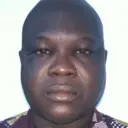 Nichola Mandil
Nichola Mandil
BBC News, Juba
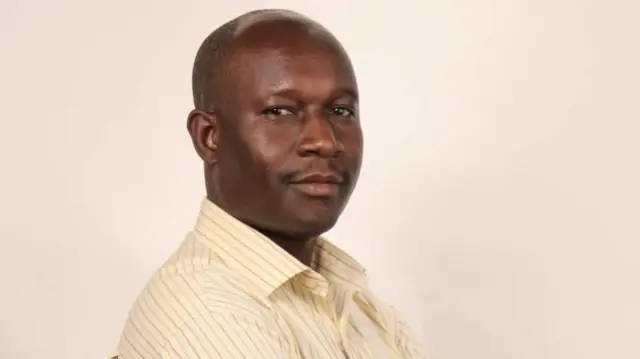 Image source, Doki family
Image source, Doki familyJournalists in South Sudan are in mourning after a high-profile South Sudanese journalist, Charlton Doki Lonyong, died at the age of 50 following a traffic accident in the capital, Juba.
Doki passed away in hospital after the accident that occurred at around 23:00 local time on Thursday on one of the city's busiest roads, the family said.
Traffic accidents are common in Juba.
Until his death, Doki was the co-ordinator and editor of VOA's South Sudan bureau.
Between 2005 and 2007, he was a news editor for the Nairobi-based USAID-sponsored Sudan Radio Service (SRS). He also worked for a number of local and international news outlets in Africa, Europe and America, before joining VOA in 2013.
Martin Fayulu has never given up saying he won in 2018 - he is now back to claim his prize.
Read More Will Ross
Will Ross
Africa editor, BBC World Service
There are reports that a commercial ship has been hijacked off the coast of Somalia - a further sign of worsening insecurity in the area.
Britain's Maritime Trade Operation reported that the crew was no longer in control of the vessel, which was heading towards the Somali coast and was almost 700 nautical miles east of Bosaso.
It is not yet clear if this was an attack by Somali pirates or if it was carried out by Houthi rebels from Yemen.
The Houthi rebels have been attacking vessels in Red Sea shipping lanes in a campaign they say aims to support the Palestinians.
Piracy off Somalia's coast peaked towards the end of the first decade of the century, but has since been mostly stopped following the intervention of an international naval force.
Brentford and Cameroon forward Bryan Mbeumo will miss the Africa Cup of Nations after undergoing surgery on his injured ankle.
Read More Aaron Akinyemi
Aaron Akinyemi
BBC World Service
At least 22 Ugandans are being held captive in Myanmar after being trafficked there for forced work, according to the Ugandan internal affairs ministry.
The Ugandan government says it is trying to rescue the 17 men and five women who were recruited by “local leaders” in the suburbs of the capital, Kampala.
The victims, who are believed to be aged between 22 and 30, reportedly thought they were being recruited to be employed in supermarkets in Thailand and to do other casual or domestic work.
However, once they arrived in Thailand, they were picked up by local contacts and taken across the border to Myanmar by road.
Derrick Basalirwa Kigenyi, Uganda’s deputy national coordinator for the prevention of human trafficking told the BBC Focus on Africa podcast: “They are kept there for labour exploitation - mainly doing online illegal activities like hacking into systems to defraud people from all over the world. I think this is to financially benefit maybe the cartels there.
“When you resist, that's when you face forms of torture. They say you don’t try to escape because you never know - you could lose your life.”
Interpol said reports have been received , externalfrom Ugandan law enforcement of several citizens being taken to Dubai for employment before being diverted to Thailand and then to Myanmar.
Earlier this year, the UN Human Rights Office released a report which revealed that hundreds of thousands of people from around the world are being forced by organised criminal gangs to work in online romance scams, external, illegal gambling and cryptocurrency fraud from south-east Asia.
Pia Oberoi, senior advisor on migration and human rights at the UN Human Rights Office (Asia Pacific), told the BBC: “A number of UN agencies have been receiving requests from consular agencies to rescue their citizens from these scam compounds.
"The problem is not every country has a consular presence in Cambodia, Laos and Myanmar. Finding out how and who you can reach to extricate a person you know is in these compounds is very difficult.”
 Will Ross
Will Ross
Africa editor, BBC World Service
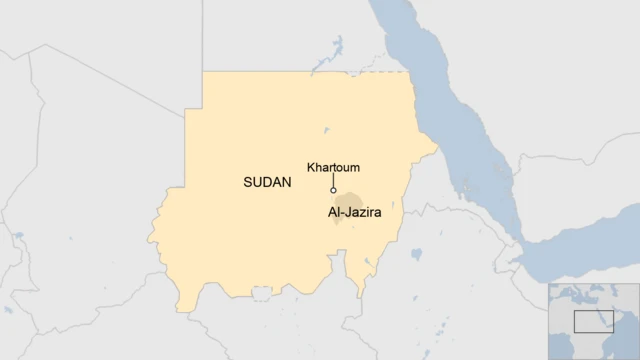
There are reports of heavy fighting south of the Sudanese capital, Khartoum, in an area which is home to hundreds of thousands of civilians displaced by the war.
Eyewitnesses report a major incursion by the paramilitary Rapid Support Forces (RSF) in al-Jazira state.
It had been a relatively safe haven.
Since the war broke out in April, around seven million Sudanese people have been forced to flee their homes.
Less than a week ago regional leaders said the warring sides in Sudan had agreed to meet for face-to-face talks to end the fighting.
But instead, the war is escalating and the displaced are getting ready to flee for their lives again.
Battles for control of Khartoum forced close to half a million people to head south into al-Jazira.
But after a major offensive by the RSF there's been fighting close to the state capital, Wad Madina, and there are fighter jets overhead.
The fact that this is a major agricultural region is also bad news in a country where millions are in desperate need of food aid but cannot be reached because of the war.
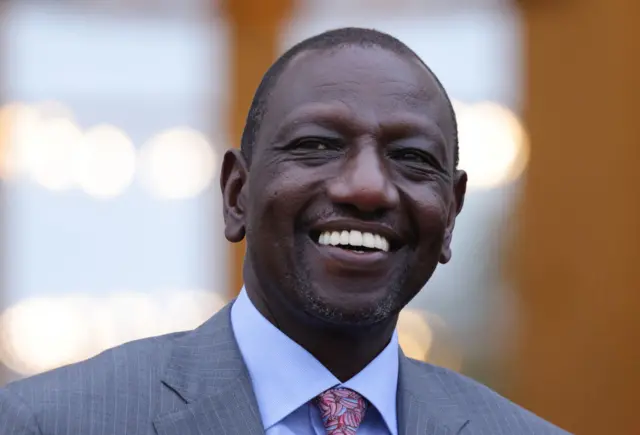 Image source, Getty Images
Image source, Getty ImagesThe agreement comes nearly a week after Kenya said it would send 1,500 farm workers to Israel
Kenya has reached an agreement to send workers to Saudi Arabia, the country's President William Ruto says.
Under the deal reached on Thursday, nurses and other skilled workers will go to the Middle Eastern country from Kenya, with 2,500 workers planned for the first deployment.
"Previously, we only sent domestic workers, but now we can export skilled labour to Saudi Arabia and other countries," President Ruto said on Friday, adding that the workers will receive a monthly salary of 200,000 Kenyan shillings ($1,300; £1,000).
The announcement comes nearly a week after Kenya's labour ministry said it will send 1,500 workers to Israel "with a guaranteed net [monthly] income" of $1,500.
Last month, President Ruto travelled to Germany to negotiate for 200,000 jobs for Kenyans.
Mr Ruto says he has been canvassing the world for employment opportunities for Kenyans, whom he said are globally renowned for their hard work.
Mr Ruto has previously said that he wants more Kenyans to find work abroad to ease country's unemployment crisis and send back money to help with Kenya's dwindling foreign exchange reserves, which has significantly weakened the Kenyan shilling in recent months.
Read more on this topic:
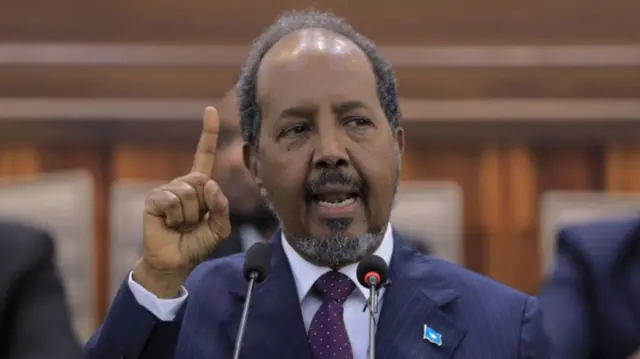 Image source, AFP
Image source, AFPSomalia was admitted into the East African regional bloc on 24 November as the eighth member state
Somalia has formally joined the East African Community (EAC), three weeks after member states admitted it into the regional bloc.
Somalia's President Hassan Sheikh Mohamud signed the treaty granting the country full membership to the bloc on Friday, in a ceremony presided by current EAC chair, South Sudan President Salva Kiir, in Uganda.
The country was admitted into the EAC on 24 November, becoming the bloc's eighth member after Burundi, DR Congo, Kenya, South Sudan, Tanzania, Rwanda and Uganda.
President Mohamud on Friday said that the formalisation of Somalia's integration into the bloc was a "beacon of hope for a future filled with possibilities" and that his country looked forward to contributing to the progress of the region.
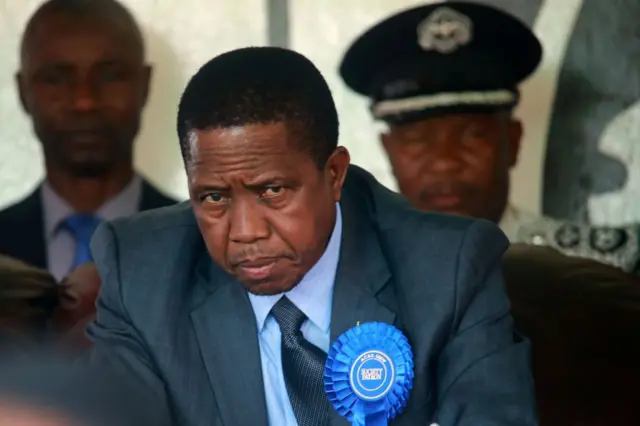 Image source, AFP
Image source, AFPEdgar Lungu says withdrawing his retirement benefits infringes his fundamental rights
Zambia's former President Edgar Lungu has gone to court to challenge the withdrawal of his retirement benefits, local media report.
Last month, Mr Lungu was stripped of his retirement benefits and privileges following his decision to return to active politics.
His office was reportedly closed, staff and security deployed and the vehicles he had been given by the government withdrawn.
In court documents seen by the privately owned News Diggers newspaper, Mr Lungu, through his lawyers, described the government's decision as an infringement of his fundamental rights.
In the document Mr Lungu says that other individuals who had held high public offices and retired were not subjected to such restrictions.
However, the country's Attorney General Mulilo Kabesha dismissed Mr Lungu's plea, saying reinstating his benefits while he was actively engaged in politics would be contrary to the law, local Diamond TV reported.
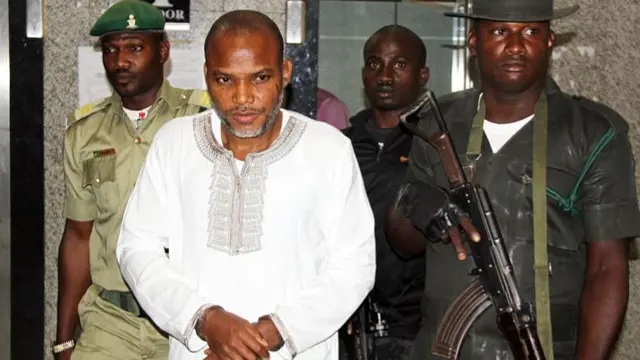 Image source, AFP
Image source, AFPNnamdi Kanu will remain in custody pending the determination of his hearing date
Nigeria's Supreme Court has ruled that separatist leader Nnamdi Kanu should be kept in prison, overturning a 2022 judgment by a lower court that ordered his release.
The court also ruled that his terrorism trial at a lower federal court should continue.
In October last year, the Appeal Court dropped all charges against him after ruling that he had been illegally arrested abroad. His lawyers said he was detained in Kenya, which has not commented on whether it played a role in Mr Kanu's deportation to Nigeria.
The court also ruled that his extradition was illegal.
Mr Kanu was never actually released and now following the Supreme Court decision, he will remain under the custody of the secret police as the government sets a date for the continuation of his trial.
He is the leader of the banned Indigenous People of Biafra (Ipob) group, which has been campaigning for the creation of an independent state in south-eastern Nigeria.
Mr Kanu was originally arrested in 2015 on treason and terrorism charges, which he denied. Mr Kano then fled Nigeria while out on bail.
In 2021 Mr Kanu, who holds a UK passport, was forcibly returned to Nigeria.
The Nigerian authorities have linked Ipob to numerous attacks on police stations and other government buildings in south-east Nigeria. The group denies any involvement.
 BBC Monitoring
BBC Monitoring
The world through its media
The Economic Community of West African States (Ecowas) regional bloc has suspended Niger's membership after the ruling military junta refused to reinstate deposed President Mohamed Bazoum.
Mr Bazoum was overthrown in a military coup in July.
Ecowas said in a statement on Thursday that a recent summit of its leaders in Nigeria “recognised” that Mr Bazoum’s government was “effectively overthrown in a military coup”.
It suspended Niger from Ecowas's decision-making bodies until “constitutional order is restored in the country”.
The situation in Niger was initially perceived by Ecowas as an attempted coup, leading to the delay in suspending the country.
Ecowas imposed sanctions and even threatened military intervention after the overthrow of President Bazoum.
 BBC Monitoring
BBC Monitoring
The world through its media
Campaigns for the forthcoming Chad constitutional referendum are expected to end on Friday.
On Sunday, Chadians will be voting in the contentious referendum that is widely seen as a move to consolidate power by transitional leader Gen Mahamat Deby.
Gen Deby has been leading the country since 2021, when his father was killed in clashes with rebels.
The adoption of a new constitution is a key step in the country’s transition from the current military-led government to a civilian one in a general election expected in late 2024.
More than eight million Chadians have registered to vote for amendments to the constitution.
Prominent opposition leader Succes Masra has endorsed the draft constitution, giving legitimacy to the document and increasing the likelihood of its passage in the referendum.
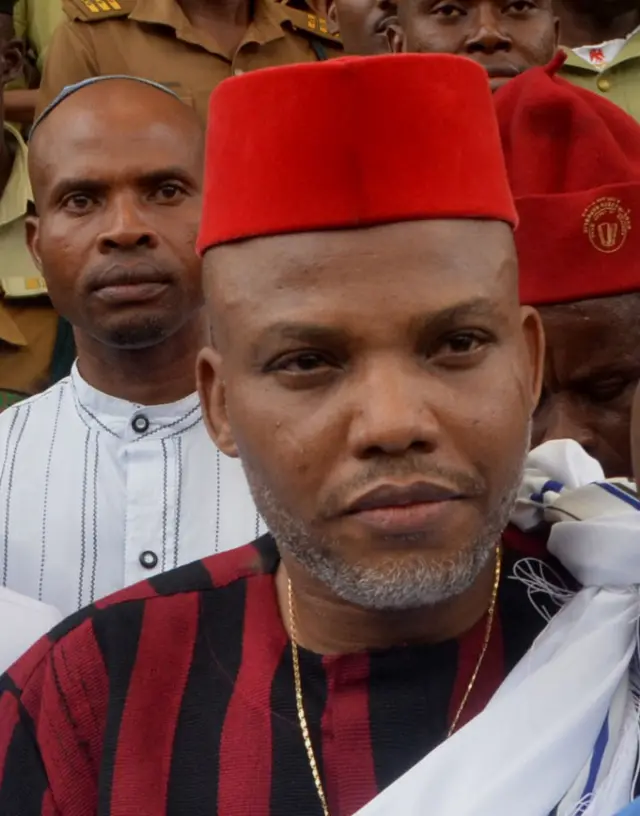 Image source, AFP
Image source, AFPNnamdi Kanu has been in detention since 2021 when he was repatriated from Kenya to Nigeria
Nigeria's Supreme Court is set to hand down a much-awaited ruling on the release of separatist leader Nnamdi Kanu.
Mr Kanu is the leader of the banned Indigenous People of Biafra (Ipob), a group campaigning for the creation of an independent state in south-eastern Nigeria.
He is seeking his release from custody, saying the government has no basis to continue holding him. The government has also submitted an appeal to extend his detention.
Mr Kanu was originally arrested in 2015 but fled Nigeria in 2017 while out on bail.
He has been in custody since 2021, when he was repatriated from Kenya to face terrorism charges.
In October last year, an appeal court ordered Mr Kanu's release, citing legal irregularities in his extradition.
The government fought the release, arguing that the separatist leader posed a flight risk and security threat.
Some leaders from south-eastern Nigeria have demanded his release.
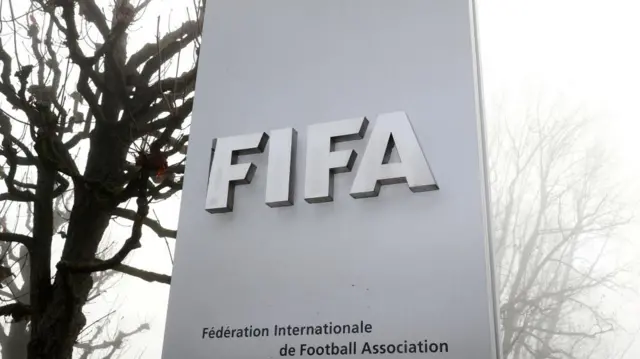 Image source, Reuters
Image source, ReutersNigerian football officials have often missed out on international competitions
World football governing body, Fifa, has approved 30 Nigerian referees to participate in various international games next year.
They comprise 11 referees, 11 assistant referees, four beach soccer referees and four futsal referees, Ademola Olajire, the Nigeria Football Federation (NFF) spokesperson, said in a statement on Thursday.
He said the referees included Basheer Salisu, Ogabor Odey Joseph, Olufunmilayo Abigael Alaba, Nurudeen Abubakar and Abdulsalam Kasimu Abiola.
Nigerian football officials have often missed out on international competitions, including the forthcoming Africa Cup of Nations in Ivory Coast.
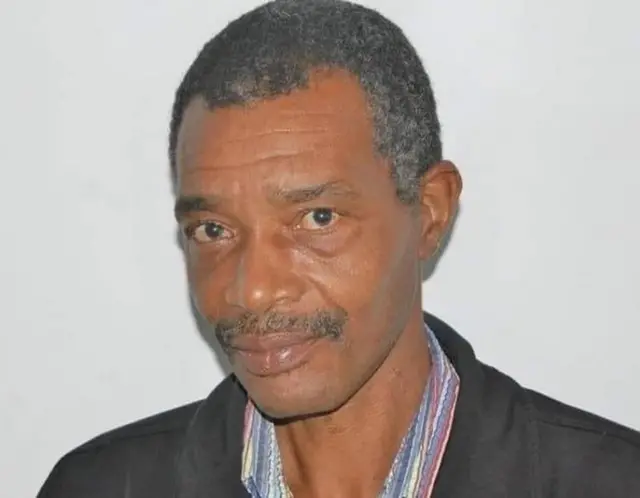 Image source, Mozambique chapter of the Media Institute of Southern Africa (Misa)
Image source, Mozambique chapter of the Media Institute of Southern Africa (Misa)João Chamusse was critical of the management of the recent local polls
Prominent Mozambican journalist João Chamusse has been found dead outside his home on the outskirts of the capital, Maputo, in a suspected murder.
Local media say he was killed by unknown assailants and that neighbours heard him screaming for help in the early hours of Thursday.
Fellow journalists say Chamusse had a wound on his head and a machete and gardening hoe were found near his body.
Chamusse, the co-owner and editor of Ponto por Ponto, a privately owned online weekly newspaper, contributed commentary critical of the government on a local TV station.
The paper says its editorial director was a "victim of murder with a knife".
In a statement, the Mozambique chapter of the Media Institute of Southern Africa (Misa), a regional press freedom group, condemned the killing.
The group said Chamusse participated in the fight for press freedoms in the country.
The Committee to Protect Journalists says it is "deeply disturbed" by the killing of the journalist and calls authorities in Mozambique to "thoroughly" investigate the incident.
The Mozambican authorities are yet to comment on the killing.
 Image source, Reuters
Image source, ReutersKenya suspended Worldcoin activities in August over data privancy concerns
Controversial cryptocurrency project Worldcoin is in advanced negotiations to resume operations in Kenya, more than four months after the authorities suspended its activities there.
The operations will continue under new and stricter regulations that will be prescribed by parliament, local media report.
The company is reportedly expected to expand its activities to more locations within the country and will continue paying users stipends.
Worldcoin - a project of US artificial intelligence company OpenAI - was suspended in Kenya in August, over data privacy concerns.
Authorities in Kenya opened an investigation into the project.
A local MP claimed that the infra-red light used by Worldcoin’s eye-scanning orbs had harmed the eyes of some users, prompting a forensic analysis into the orb.
Wordcoin, however, told the BBC that the orb was safe and complies with international standard specifications.
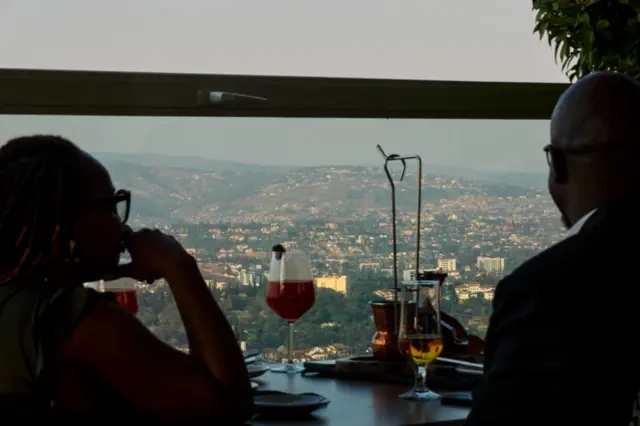 Image source, Getty Images
Image source, Getty ImagesBars and nightclubs have been opening for shorter hours since September
Rwanda's government has relaxed operating restrictions for bars, nightclubs and other entertainment establishments during the festive season.
The restrictions on all "non-essential services" were imposed in September by the authorities to curb "noise pollution" and public disturbance.
Entertainment businesses were operating under shorter opening hours - restrictions that were unpopular with hotel, restaurant and nightclub owners.
But the state-run Rwanda Development Board now says that between 15 December and 17 January bars can stay open until 02:00 (local time), with restrictions removed on Fridays, weekends and public holidays.
“The end of the year festive season has begun, and the government of Rwanda wants people to celebrate and enjoy,” the board said in a statement on Thursday.
The new guidelines apply to private events as well, it added.
However, the board warned against violations, saying establishments should comply with rules around noise pollution.
Sound levels in commercial areas are limited to 55 decibels at night, under the measures announced in September.
Our African proverb of the day:
Quote MessageYou may be clever but you can never lose your shadow."
An Igbo proverb sent by Orazulike Chinelo Mmesoma in Lagos, Nigeria